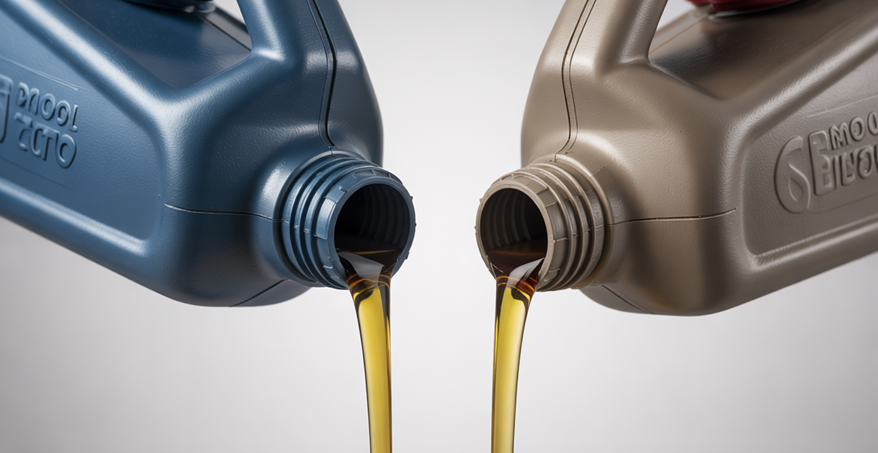Clearing up the confusion between synthetic and conventional engine oils—learn what's really best for your car’s performance, avoid costly myths, and protect your engine for years of trouble-free driving.
As an automotive specialist deeply passionate about engines and vehicle performance, I’ve encountered countless myths regarding engine oil, particularly in the debate of synthetic vs. conventional oil. It’s time to clear the air and help you make an informed decision that benefits your car’s longevity, performance, and ultimately, your wallet.
Let’s debunk the most persistent myths and clarify the differences between synthetic and conventional engine oils to determine what’s genuinely best for modern vehicles.
Myth #1: Synthetic Oil is Just Marketing Hype
Many drivers assume synthetic oil is merely expensive marketing fluff. Let’s dispel this myth: Synthetic oil is scientifically formulated to provide superior performance compared to conventional alternatives. Synthetic oils offer greater lubrication, better temperature stability, and significantly reduced friction, essential for modern, high-performance engines like the 2024 Ford Mustang EcoBoost (around $32,000 to $38,000) or the efficient 2024 Toyota Prius (approximately $28,000 to $35,000).
Additionally, synthetic oil reduces engine deposits, improving fuel efficiency and extending engine life. These benefits aren’t marketing gimmicks—they’re proven technological advancements.
Myth #2: Conventional Oil Is Sufficient for New Cars
While conventional oil may adequately lubricate older engines, many modern U.S. cars have tighter engine tolerances and operate under higher temperatures. Vehicles such as the turbocharged 2024 Chevrolet Silverado 1500 (priced roughly between $38,000 and $65,000) or the compact but turbocharged 2024 Honda Civic (approximately $26,000 to $32,000) significantly benefit from the thermal stability and cleaner-running characteristics of synthetic oil.
Conventional oil, priced usually around $25 to $35 per oil change, might initially appear budget-friendly compared to synthetic oil changes ($55 to $75), but this savings could quickly evaporate through reduced fuel efficiency, frequent changes, and potential engine wear in advanced engines.
Myth #3: Synthetic Oil Makes Oil Changes Unnecessary for Thousands of Miles
While it’s true that synthetic oil offers extended change intervals, claiming you never need to change your oil frequently is misleading. Typically, manufacturers of vehicles like the 2024 Subaru Outback ($29,000 to $42,000) recommend synthetic oil changes every 7,500 to 10,000 miles, compared to conventional oils at approximately 3,000 to 5,000 miles.
Ignoring regular oil changes—even with synthetic—risks engine deposits, performance deterioration, and potentially costly repairs. Always refer to your vehicle’s owner manual and manufacturer’s recommendations to stay safely within the ideal range.
Myth #4: Synthetic Oil Causes Engine Leaks in Older Vehicles
This is perhaps one of the most enduring myths: Synthetic oil causes leaks, especially in older cars. Let’s clarify—synthetic oil itself does not cause leaks. However, if your older vehicle, such as a 2008 Honda Accord ($5,500 to $8,000) or a 2010 Toyota Corolla ($6,000 to $9,500), has worn seals, sludge deposits, or existing oil leaks, synthetic oil’s superior cleaning capability might reveal or exacerbate leaks by removing accumulated sludge and buildup.
Therefore, if you’re considering switching to synthetic in older models, ensure seals and gaskets are in good condition. Properly maintained older vehicles can reap synthetic oil’s substantial benefits without any adverse effects.
Myth #5: Synthetic Blends Offer No Real Advantage
A widespread misconception among drivers is that synthetic blends—a combination of conventional and synthetic oils—offer minimal advantage over traditional oils. However, synthetic blends provide an excellent middle ground. Vehicles like the 2024 Ford Explorer ($38,000 to $55,000) or the 2024 Jeep Grand Cherokee ($41,000 to $68,000) can notably benefit from synthetic blends, which provide better protection and enhanced performance at slightly lower costs (typically around $35 to $50 per oil change).
For budget-conscious drivers who desire better performance without committing entirely to synthetic, synthetic blends present a balanced, cost-effective solution.
Myth #6: You Can’t Switch Back to Conventional Oil Once You Go Synthetic
Here’s another myth that needs correction—there is absolutely no harm in switching from synthetic back to conventional or vice versa. Modern oils, whether synthetic, conventional, or blends, are fully compatible. Drivers who alternate between oils to save costs during different seasons or driving conditions will face no negative consequences.
Yet, consistency often delivers the best long-term benefits. Frequent oil changes and high-quality oils typically translate to greater reliability and performance in models like the 2024 Tesla Model 3 (around $41,000 to $57,000) (though electric vehicles obviously have different lubrication needs) or the 2024 Hyundai Elantra ($22,000 to $28,000).
Synthetic vs. Conventional: What’s Best for Your Car?
Ultimately, choosing between synthetic and conventional oil depends on your vehicle type, driving habits, and budget. Modern cars increasingly recommend synthetic oil for its clear advantages in engine protection, longevity, and performance, particularly critical for turbocharged engines or high-performance vehicles.
-
Synthetic oil: Ideal for newer, performance-oriented vehicles demanding enhanced lubrication, cleanliness, and temperature stability.
-
Conventional oil: Suitable for older vehicles, non-performance models, or when strict budget considerations prevail.
-
Synthetic blends: A great option for drivers who desire a balance between cost and performance.
Make the choice based on your car’s specific needs, always consulting your vehicle’s owner manual or your trusted mechanic’s recommendations.
By debunking these pervasive myths, you can confidently select the best oil to enhance your car’s performance and longevity, ensuring smoother rides for miles ahead.


